The Mandalorian Becomes the Detective in Chapter 22, ‘Guns For Hire’
Messy galactic politics and diplomacy sidetrack Bo-Katan Kryze (Katee Sackhoff) and Din Djarin (Pedro Pascal), though their latest gig offers some precious upside.
The pace and structure of The Mandalorian means even something as simple as confronting Bo-Katan Kryze’s (Katee Sackhoff) former forces requires something more involved. That, in turn, means Chapter 22: “Guns For Hire” is as much a detective story as it is an exploration of galactic politics and diplomacy. But does it prove Din Djarin (Pedro Pascal) is fit to lead or is Bo-Katan finally ready to rule her people? Let’s take a look at the latest adventure of the wandering Mandalorian to see what could happen next in Mandalore’s slow-motion restoration.
Spoiler alert: The following reveals details from the sixth episode of The Mandalorian season 3, “Chapter 22: Guns For Hire.” Stop reading here if you have not watched the episode and wish to avoid spoilers.
“All It Takes Is a Few Credits”
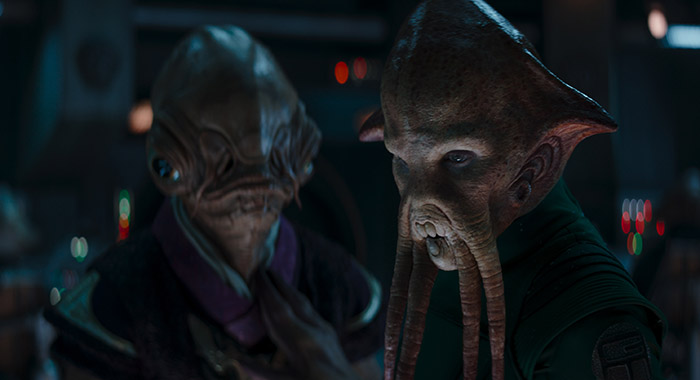
(Photo by Lucasfilm Ltd.)
Before the plot truly begins, though, we are treated to an update on the exploits of Axe Woves (Simon Kassianides) and Koska Reeves (Mercedes Varnado). True to Bo-Katan’s explanation from earlier in the season, they are working as mercenaries — although they clearly prefer the term “privateer” — and as seen in the prelude, that means doing jobs like retrieving a young member of the Mon Calamari nobility from a love affair with a Quarren ship captain. For those not immersed in Star Wars lore, the star-crossed lovers are a true oddity as the two species, despite sharing the planet Mon Cala (aka Dac), are often at odds; hence, why the captain refers to maintaining the peace when questioned by Woves.
But the most important detail here is Reeves’ response when questioned about Mandalorian honor: “All it takes is a few credits.” The statement is more revealing than one might think. In the emerging religion of the Mandalorians, they have truly lost The Way, but beyond that is a more generalized sense of being adrift in space. The Nite Owls, or whatever they go by now, are very much focused on credits instead of any sense of honor. The Mandalorians always straddle this line between honor and income, but the cynicism here is different.
See also Woves’ statement that he likes being in charge. It suggests something more self-serving or, perhaps, decadent. Since he has only spoken 10 lines or so across his two appearances, however, it is as difficult to ascertain his true heart as it has been to decipher Paz Vizsla’s ambitions. Bo-Katan’s failure to return with the Darksaber two years earlier seems to have disillusioned her former flock in a very fundamental way; however, the episode ends on a note that some of their faith has been restored.
“Politics”
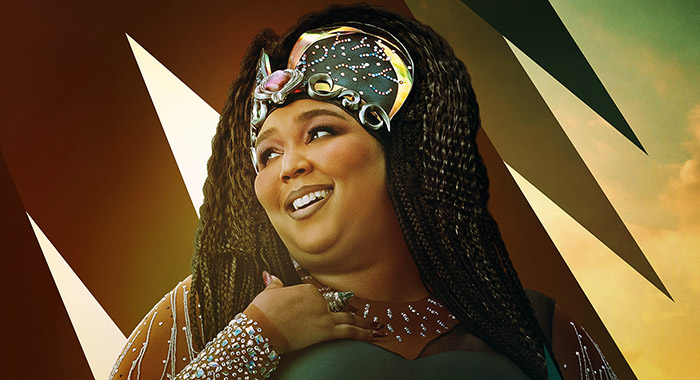
(Photo by Lucasfilm Ltd.)
While Mandos are generally depicted as being averse to the forms of politics employed by most of the galaxy, diplomacy is a water they must wade in and this episode may be the most blatant exploration of its necessity to the likes of Bo-Katan and Djarin on any given day, let alone in regards to restoring Mandalore.
Arriving on Plazir-15, the pair quickly meet its duly elected Duchess (Lizzo) and her consort, Captain Bombardier (Jack Black). Here, Bo-Katan proves a certain aptitude in politics of a royal nature; she accepts a drink when they are escorted to a feast, and she knows the right decorum for the situation even as she investigates how a former Imperial ended up married to the local nobility. And while the planet prides itself in being the Outer Rim’s only direct democracy, it is clear older traditions still hold sway.
Bo-Katan’s ability to navigate those traditions leads to a most intriguing offer. Due to various local laws and agreements with the New Republic, Plazir-15 has no military and their constables cannot carry weapons, but because Bo-Katan and Djarin are Mandalorian, they are allowed to carry their weapons into the domed capital city. That makes them ideal to investigate a string of increasingly severe droid malfunctions. In exchange for doing so, the Duchess and Bombardier agree to recognize Mandalore as an independent system and, furthermore, to petition the New Republic senate to do likewise.
It might seem a small point in light of the rest of the episode, but this sort of thing is key for Mandalore in the future. For one thing, independent status would be huge as Mandalore’s place in the Republic has been questionable since the Mandalorian Wars some 4,000 earlier. Secondly, re-establishing a diplomatic foothold with at least one planet gives Bo-Katan more validity as a head of state. We’re not sure she was thinking that far ahead in the moment, however; her primary concern was just to talk to her former troops.
Read also: The Mandalorian Chapter 21: Leaders Emerge When Nevarro Battles a Pirate Infestation
But there are varying forms of politics and diplomacy on display in the episode. The next example occurs after a meeting with Plazir-15’s head of security, Commissioner Helgait (Christopher Lloyd), who directs the newly minted detectives to a subfloor where a group of Ugnaughts retrofit Clone War era droids for civilian service.
Here, Bo-Katan proves ineffectual while Djarin knows enough of their customs, thanks to the fondly remembered Kuiil (Nick Nolte), to get some good intel out of the team. And just to prove how much this resembles the high-level diplomacy with the Duchess, Djarin and Bo-Katan end up seated with the Ugnaughts as Djarin walks back any accusation that the droids are malfunctioning. He later tells her such a suggestion is one of the highest insults among the species. His specific knowledge, of course, gets them to the next link the chain and, ultimately, the true culprit of the droid sabotage: Commissioner Helgait.
His motivations are also political in nature as he turned out to be a true believer in the Separatist movement from the days of the Clone Wars. Although, to be fair to him, “Separatist” is a term applied by partisans of the Old Republic to the Confederacy of Independent Systems who broke away from the Republic citing an irreconcilable corruption within its government. At the same time, though, it is tough to give the movement much credence as it was a smoke screen for Sheev Palpatine’s (Ian McDiarmid) ascendancy to Emperor.
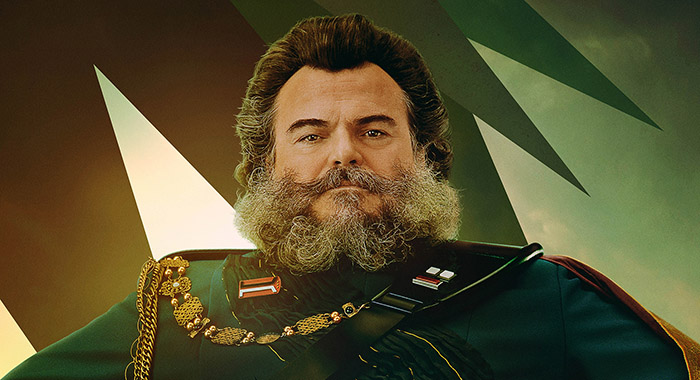
(Photo by Lucasfilm Ltd.)
Nevertheless, Helgait represents someone who still believes and sees any attempt by the New Republic to organize the Outer Rim as a return to very old and very corrupt ways; although it is interesting that he cites Bombardier’s presence as the real reason he smuggled bad code into droid lubricant (more on that in a moment). Considering what we’ve seen of the Republic’s amnesty program, it is possible Bombardier’s pleasant demeanor and demonstrations of affection for the Duchess could be more Imperial duplicity. Then again, Black’s on-screen persona suggests a person whose faith in the Empire was never that strong to begin with.
The decadence among the Plazir nobility could be part of a plan to bring the planet under the grip of the First Order in the years to come, or course. Helgait may have been the first to see it.
But the savviest political move of the hour is Djarin finding a way to hand Bo-Katan the Darksaber without a fight. Throughout the season, we’ve wondered why Bo-Katan allowed him to leave the Imp cruiser without a fight and never really considered how he might resolve the issue. His solution: citing her use of the weapon to save him from the droid-assisted creature in the Mines of Mandalore and the chain of custody from him, to the creature, to Bo-Katan as proof that he was merely returning her fairly-won property.
Woves and the others go for it, which once again proves Djarin has some acumen for politics and diplomacy, but it also finally puts her back in the position to rule a restored Mandalore — provided she believes in this loophole. As we’ve noticed across the season, Bo-Katan is becoming a believer in the superstitions of the Way. She saw the mythosaur, and she no doubt acknowledges her failure to prevent Mandalore’s fall as a consequence of being given the Darksaber without a fight before (as seen on Star Wars Rebels). It is possible her doubts and memories of the Night of a Thousand Tears may lead her to challenge Djarin for “true” possession of the blade.
In the meantime, it is interesting to note that Djarin stopped fighting the blade by handing it off to someone else.
“You Had Me at Battle Droids”
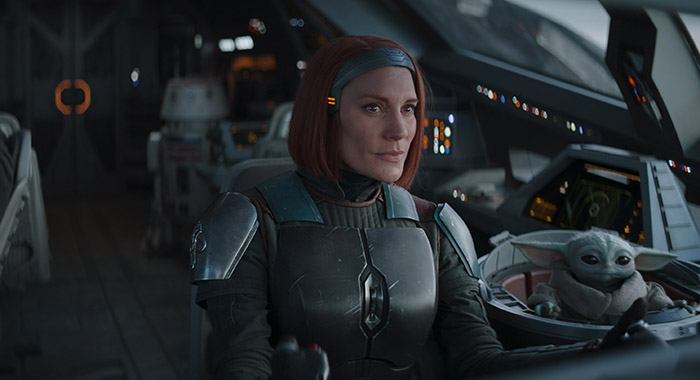
(Photo by Lucasfilm Ltd.)
Djarin and Bo-Katan’s investigation leads them to a droid bar — a wonderful expansion of one of Star Wars earliest worldbuilding ideas (the original film’s “We don’t serve their kind here” moment). In lieu of facing persecution in a bar for organic sentients, droids gather in their own establishments to imbibe a substance called Nepenthé. Described as “viscous lubricant” that prevents mechanical failure, it also offers “program refreshing” particles; a liquid software update. For the purposes of the episode, it is how Helgait caused the retrofitted battle droids to malfunction, but in the larger galaxy, it also creates more of a droid culture. Regardless of model or function, all droids can relax and enjoy a drink all their own.
Indeed, the episode’s droid bartender introduced a new angle on this culture: droids want to serve organics as repayment for being created. Although this could be argued as a key part of droid source code, it is interesting to think droids determined this on their own as a compassionate response to the limited lifespans of most species in the galaxy.
If it is a self-determined compassion, it strikes an interesting contrast to Djarin’s prejudice against the robots. As established early in the series’ run, his village was smashed to pieces by super battle droids in the waning days of the Clone Wars, and his wariness of most droids emerges from that early trauma. It is unclear if the droid bartender swayed him in any way — the scene occurs after he started kicking Super Battle Droids to determine which one was malfunctioning — but maybe he’ll be a little kinder to R5 after this.
Meanwhile, the bartender’s words will ring a certain way for fans of the Knights of the Old Republic video games and its assassin droid, HK-47, whose view of “meat bag” organics was anything but compassionate.
Odds and Ends
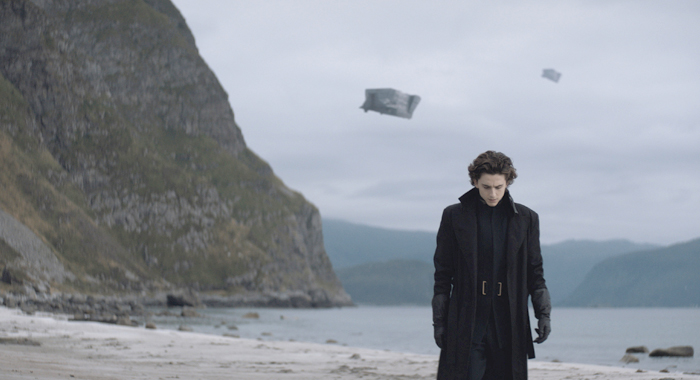
(Photo by Warner Bros. Pictures and Legendary Pictures)
• Plazir-15’s reliance on droids, as explained by Helgait, is sharply reminiscent of Dune’s prehistory, in which the human race’s reliance on artificial intelligences and robots led to similar levels of dependance and, eventually, the robots turning on their fleshy masters. The technology and mental prowess seen in Dune (both the books and the film versions) are products of a ban against thinking machines following the Butlerian Jihad to overthrow the robots over 10,000 years before the events of Frank Herbert’s first novel. It is doubtful Star Wars would move in a similar route, though, as droids have co-existed with organics (if uneasily at times) for millennia. Nevertheless, connections between the two space-faring epics abound. This one, we think, is a more intentional allusion. (Pictured above: Timothee Chalamet in 2021’s Dune.)
• Djarin walks this episode without his jetpack. And considering how important the device is to Bo-Katan’s fighting style, we wonder if the Mandalorian will ever be properly trained to use it. Perhaps now that Bo-Katan has declared he is every bit a Mandalorian as the Nite Owls, maybe one of them will put him through his paces, er, “flights.”
• The Key to Plazir is an interesting totem for Bo-Katan to win. Will she use it, or its symbolic significance, to further diplomatic relations once she resettles Mandalore?








